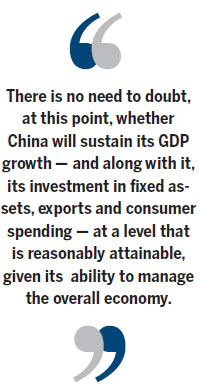Reform needs same urgency as growth
Updated: 2014-07-18 08:26
By Ed Zhang (China Daily Europe)
|
|||||||||||
Change essential for long-term economic health is neglected amid passion to keep GDP high
No one should be mistaken about the strengths and weaknesses of China's economy, based on its growth records of the first half of 2014.

It has the unquestionable ability to deliver continuing growth, despite many short-term problems. But its ability to deliver reform, which Chinese sometimes call transition, is still in question.
To be sure, there won't be a major crash of any sort - in the bursting of a real estate bubble or in sweeping defaults of local government debts or in huge stockpiles as a result massive manufacturing overcapacity. Alarms were sounded quite a few times about such a crisis, but none has materialized.
One set of problems in Shanghai and Guangzhou can be offset by another, largely different set in the central and western frontier regions, where many cities are still in the early stage of their industrialization.
At the same time, a central government that is capable of regulating population growth shouldn't have a shortage of means to balance and rebalance the country's economic resources.
There is no need to doubt, at this point, whether China will sustain its GDP growth - and along with it, its investment in fixed assets, exports and consumer spending - at a level that is reasonably attainable, given its ability to manage the overall economy.
Economists and government think tanks can keep sending out alarms. Their main function is to serve as an early warning system for the macroeconomic policymakers before they take pro-cyclical moves, as Premier Li Keqiang said, to prevent the business cycle from changing too wildly.
More specifically, for at least 10 years, one strategy can be used repeatedly to generate growth and jobs in China without leading to waste. Modernizing public infrastructure for still underdeveloped areas, building more nuclear power stations, erecting recharge stations for electric vehicles nationwide and phasing out coal stoves in all small towns and villages - each of these would help the country generate a lot of GDP.
Similar things can be done on the provincial level, so long as local governments maintain a favorable credit rating record.

A couple of other national projects can always be embarked upon whenever exports flag or consumer spending fails to generate enough growth. The announcement of such projects can trigger an almost immediate reaction from the stock market - companies that are likely government suppliers start issuing new shares.
Such a trigger effect, in contrast, has yet to be seen for reforms. Many policies that are supposed to help China's long-term growth have been announced by the central government since late 2013. But quite a few have remained only on paper because of resistance and inaction from local bureaucracies.
The ongoing anti-corruption campaign has a serious limitation: It can do nothing about the officials who don't take bribes, don't have unreported income from businesses, or don't keep mistresses, but just don't do their jobs under the sympathy-inducing pretext that they don't want to make any more mistakes.
Not a single one of the central-level state-owned enterprises has made progress in any area enumerated by the reform program that the top leaders adopted last November.
It was only a week ago that a few committees were set up under the State-owned Assets Supervision and Administration Commission to experiment with some of the reform ideas at a few companies. By the time any reform is actually launched, as one can imagine, it would have taken another half-year. Given that timeline, it would take one more year, at least, for any of the reforms to bear fruit.
Is there any way to speed up reform and to somehow force the SOEs to show more action?
How about ways to boost the growth of a new, more innovative and globally competitive block of the economy?
These questions remain unanswered while China is generating new growth.
The author is editor-at-large of China Daily. Contact the writer at edzhang@chinadaily.com.cn
(China Daily European Weekly 07/18/2014 page11)
Today's Top News
Burning wreckage, bodies scattered after jet downed
US widens sanctions on Russia over Ukraine
Hamas agrees on 5-hr ceasefire
Chinese killed in Moscow metro derailment
Obama vows info co-op to Merkel
Filipinos flee as typhoon hits coast
China ends drilling operations in South China Sea
Economic ties with Latin America grow
Hot Topics
Lunar probe , China growth forecasts, Emission rules get tougher, China seen through 'colored lens', International board,
Editor's Picks

|

|

|

|

|

|





